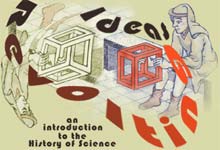
University of California, Irvine
Instructor: Dr. Barbara J. Becker

|
Week 2. Transmission Trouble Preservation vs. Modification |
Supplementary readings for Week 2's lectures include excerpts
from:
|
In the long run, it's not always what you know that really matters. If your ideas are to have any lasting influence, you will need to find a reliable way to communicate them--without distortion--to others. Therein lies the challenge.
Take the case of Socrates (470-399 BCE), the great Athenian philosopher and teacher. Socrates left no written record of his thoughts. Yet, despite the formidable barriers of time, space, language and culture that separate our lives from his, we are able to eavesdrop as he leads his circle of intimates through a thicket of difficult questions about the nature of human affairs: How is the State to be governed? Are laws of justice divine (matters of Truth) or man-made (matters of Opinion)? Is there such a thing as virtue? Can justice be taught?
How do we know so much about Socrates' life, his philosophy and investigative method? Mainly from the writings of his student, Plato.
In The Republic, written four decades after Socrates' execution, Plato skillfully constructs a parable to showcase his teacher's ideas on what humans can know of the world and how that knowledge can be attained.
As you read this parable, take time to pause briefly and close your eyes. Let Plato's powerful verbal imagery imprison you in his conjured cave world.Around age twenty, Adelard of Bath traveled to France where he studied at the three-centuries-old cathedral school in Tours founded by Charlemagne. He traveled widely throughout his life and visited centers of learning in Europe, Asia Minor, and North Africa. He occasionally returned to England to share the knowledge he had gained in his travels.Do you think the opinions expressed in this parable more closely represent those of Socrates or of Plato? How can we be sure? Plato knew Socrates personally. Does that make Plato an unimpeachable source on the life and work of his teacher? Does it matter whose ideas the parable represents?
Adelard was one of the first Europeans to translate scholarly works from Arabic into Latin. Because of his efforts, Euclid's Elements and al-Khwarizmi's works on arithmetic and trigonometry were made available to a new audience. In addition, Adelard's practical treatises on the abacus, the astrolabe, Arabic numerals and zero helped to introduce the use of these important mathematical tools into the West.
In Quaestiones Naturalis, Adelard presents an instructive conversation between a young parochially-educated nephew and his wiser, more sophisticated uncle (Adelard). Adelard lived nearly 1500 years after Plato, at a time when Timaeus was the only work of Plato's known to learned Western Europeans. What similarities and differences do you notice between Adelard's dialogue style and that used by Plato in the Timaeus?Alexander Neckam was born in England. The name "Neckam" (from nequam, meaning "bad") allegedly derives from his practice of necromancy (black magic). Like Adelard before him, Alexander traveled to France for his studies. By the time he arrived in Paris, the cathedral school at Notre Dame was probably well on its way to becoming the University of Paris (chartered in 1200). After he returned to England in 1186, he is reputed to have become a professor at the embryonic university then developing at Oxford.
Alexander wrote De Naturis Rerum to provide moral instruction for his readers. How does he explain the physical phenomenon of refraction? Do you think a modern-day scientist would characterize Alexander's ideas on the behavior of light as "scientific"? How would you characterize them?
|